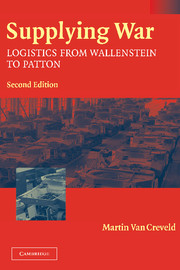Book contents
- Frontmatter
- Dedication
- Contents
- Maps
- Preface
- Introduction
- 1 The background of two centuries
- 2 'An army marches on its stomach!'
- 3 When demigods rode rails
- 4 The wheel that broke
- 5 Russian roulette
- 6 Sirte to Alamein
- 7 War of the accountants
- 8 Logistics in perspective
- Postscript: Where are we now?
- Note on sources
- Bibliography
- Notes
- Index
Introduction
Published online by Cambridge University Press: 22 June 2023
- Frontmatter
- Dedication
- Contents
- Maps
- Preface
- Introduction
- 1 The background of two centuries
- 2 'An army marches on its stomach!'
- 3 When demigods rode rails
- 4 The wheel that broke
- 5 Russian roulette
- 6 Sirte to Alamein
- 7 War of the accountants
- 8 Logistics in perspective
- Postscript: Where are we now?
- Note on sources
- Bibliography
- Notes
- Index
Summary
Logistics are defined by Jomini as ‘the practical art of moving armies’ under which he also includes ‘providing for the successive arrival of convoys of supplies’ and ‘establishing and organizing.. • lines of supplies'.1 Putting these together, one arrives at a definition of logistics as ‘the practical art of moving armies and keeping them supplied', in which sense the term is used in this study. The aim of the study is to arrive at an understanding of the problems involved in moving and supplying armies as affected through time by changes in technology, organization and other relevant factors; and, above all, to investigate the effect of logistics upon strategy during the last centuries.
Strategy, like politics, is said to be the art of the possible; but surely what is possible is determined not merely by numerical strengths, doctrine, intelligence, arms and tactics, but, in the first place, by the hardest facts of all: those concerning requirements, supplies available and expected, organization and administration, transportation and arteries of communication. Before a commander can even start thinking of manoeuvring or giving battle, of marching this way and that, of penetrating, enveloping, encircling, of annihilating or wearing down, in short of putting into practice the whole rigmarole of strategy, he has - or ought - to make sure of his ability to supply his soldiers with those 3,000 calories a day without which they will very soon cease to be of any use as soldiers; that roads to carry them to the right place at the right time are available, and that movement along these roads will not be impeded by either a shortage or a superabundance of transport.
It may be that this requires, not any great strategic genius but only plain hard work and cold calculation. While absolutely basic, this kind of calculation does not appeal to the imagination, which may be one reason why it is so often ignored by military historians. The result is that, on the pages of military history books, armies frequently seem capable of moving in any direction at almost any speed and to almost any distance once their commanders have made up their minds to do so. In reality, they cannot, and failure to take cognizance of the fact has probably led to many more campaigns being ruined than ever were by enemy action.
- Type
- Chapter
- Information
- Supplying WarLogistics from Wallenstein to Patton, pp. 1 - 4Publisher: Cambridge University PressPrint publication year: 2004



